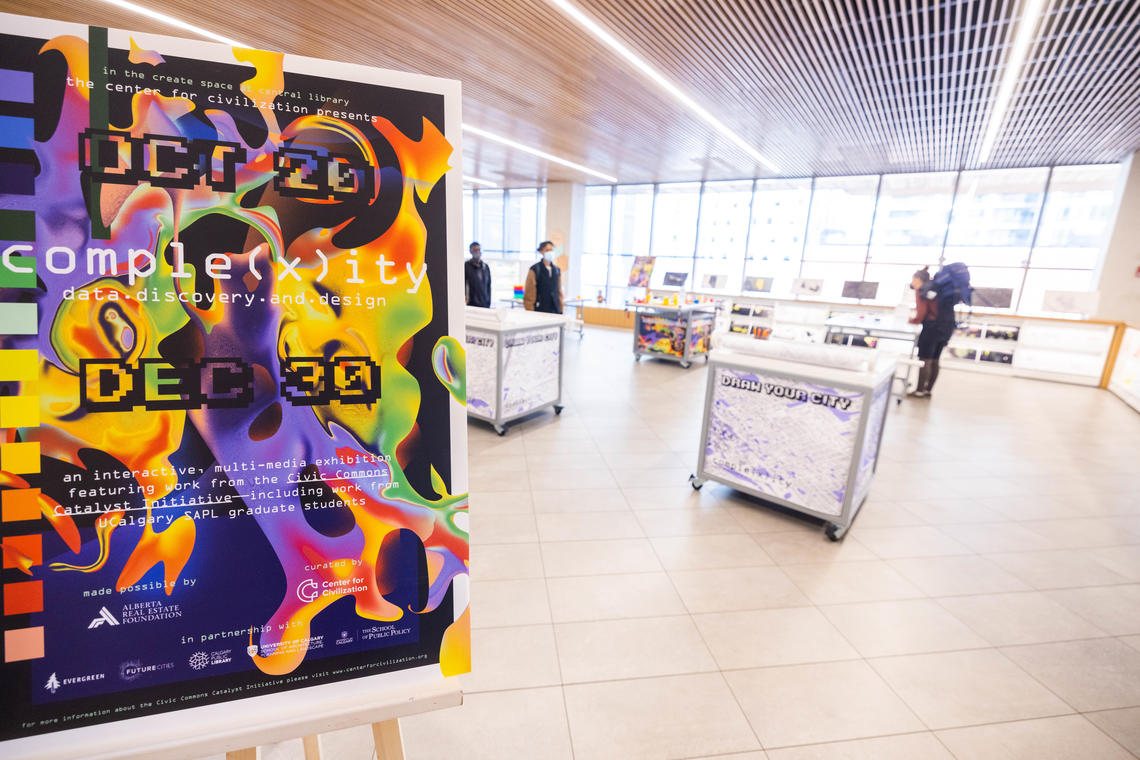Dec. 1, 2021
City-building research positioned to catalyze the reimagining of downtown

A hyperloop station, a waste-to-energy facility, a Calgary airport-downtown-Banff rail, urban ramblas, crypto-mining farms, hydroponic facilities, an innovation district augmented by a smart city strategy and an artist/rainbow village. These are just a few of the interventions that the Civic Commons Catalyst, a research partnership under the Center for Civilization between the University of Calgary’s School of Architecture, Planning and Landscape (SAPL), the School of Public Policy (SPP), Evergreen, the City of Calgary — and funded by the Alberta Real Estate Foundation — is proposing to reinvent downtown Calgary’s vacant public spaces and spur economic recovery and investment.
Alberto de Salvatierra, SAPL assistant professor and director and founder of the Center for Civilization, is the principal investigator of the initiative. He explains: “The goal of Civic Commons Catalyst is to create a more resilient future for Calgary’s vacant downtown spaces. Our Phase 1 research culminated in 20 strategic recommendations for unique spatial projects that will transform downtown Calgary, and help spur economic recovery and investment.”

Civic Commons Catalyst Downtown Catalogue.
Image courtesy of Center for Civilization
The proposals catalyze underused spaces across the city into positive assets for the public, allowing communities to pioneer an innovative future backed by data and design-at-scale. Interviews, horizon scanning, public policy, finance innovation, geospatial data, and urban design, along with the support of 13 UCalgary graduate students, were used to gather the data and determine the interventions.
“Something I found interesting while working with the Center for Civilization is that interdisciplinary collaborations do result in more unique and innovative research products,” says Ji Song Sun, MArch’21 and MEDes’22 candidate, who works closely with de Salvatierra as head graduate research assistant with the Center for Civilization.
“The multi-layered research outcomes with graphically appealing visuals can inspire and attract a lot more stakeholders and partners who share similar interests and values.
“What is great about research projects at the CFC is that we are never about developing hypothetical results and ending it there. Instead, we have the capabilities to transform our digital projects into real-life businesses that involve more specific discussions about timelines, budgets, as well as industry collaborations while engaging closely with the city officials, NGOs, community members, urban designers, etc. These experiences are very difficult to have as students, but the Center for Civilization provides those unique moments through research projects and prepares the GARs, including myself, for the next steps in our careers.

Exhibition featuring work of the Catalyst at the Central Library until Dec 30.
Photos by Neil Zeller

While navigating the challenging circumstances presented by the pandemic, de Salvatierra has secured nearly a million dollars in project support from a range of organizations, including a grant from the Alberta Real Estate Foundation. This funding allows the project to move into Phase 2 with an expanded team of 25 researchers and will focus on bringing stakeholders, such as building owners and operators, developers, policy-makers, community associations and civic leaders, together to facilitate these 20 recommendations and turn them into reality.
As Calgary moves into Phase 2, Lethbridge, Medicine Hat and Okotoks will start Phase 1 research.
Sun adds, “I find the [Catalyst] initiative very meaningful in the sense that we’re not trying to be better than other places through a distinctive solution, but instead we’re trying to develop a framework that can positively impact different cities, towns, or even neighbourhoods in various ways. The research methods, findings, and solutions are designed to be readapted and implemented by other cities across Canada, or, perhaps in the future, cities in other countries.”

Images R to L: Sample spatial analysis maps – landscapes of risk, urban atractors, disjointed public spaces.
Courtesy of Center for Civilization
Currently, the Civic Commons Catalyst is encouraging interested parties to reach out to collaborate on these interventions.
In addition, select existing Phase 1 work is viewable until Dec. 30 in the Create Space at the Central Library in the interactive exhibition “Comple(x)ity: Data, Discovery and Design.”
In 2022, this research on Alberta’s innovative approach to downtown revitalization will be shared in a series of knowledge mobilization activities. The project’s work will also be available to the public through lectures, exhibitions and a regional/national forum hosted by Evergreen.
The project is part of Urban Alliance, a strategic partnership between The City of Calgary and UCalgary to promote the seamless transfer of cutting-edge research for the benefit of all of Calgary’s communities. The initiative is supported by, and leverages, Evergreen and Future Cities Canada’s history of convening networks and incubating social labs and participatory design practices for complex urban issues.
Download Civic Commons Catalyst 2021: Strategic Interventions briefing report
Parties interested in collaborating on this project can email de Salvatierra at alberto.desalvatierr@ucalgary.ca.
About the Civic Commons Catalyst
The catalyst is an interdisciplinary research and innovation platform embedded within City Building Design Lab at the School of Architecture, Planning and Landscape, University of Calgary. Partner faculties include the School of Public Policy and Haskayne School of Business. It is funded by the Alberta Real Estate Foundation. The project is part of Urban Alliance, a strategic partnership between The City and the University of Calgary to promote the seamless transfer of cutting-edge research for the benefit of all of Calgary’s communities. The catalyst is part of the Future Cities Canada collaborative platform, and is supported by Evergreen.






